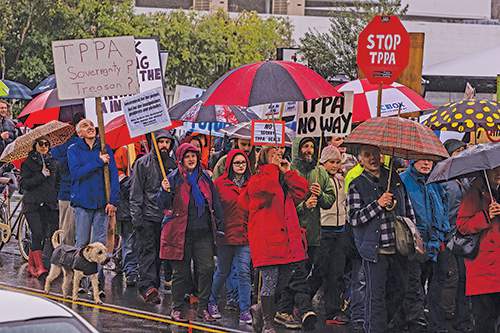[quote_box_right]Here one of several voices on the TPPA. Make no mistake that the TPPA will affect you and your grandchildren. It is a treaty the Government is negotiating in secret. It is binding and it has been fiercely criticised. Be informed. Also see www.itsourfuture.org.nz[/quote_box_right]
As Trans-Pacific Partnership Agreement (TPPA) negotiations gear up for another round of trying to hammer out the finalities, it is important that we remain cautious over what we are being told.
Secrecy
This may seem like ringing the same old bell, but it is an important issue to straighten out. Yes, this agreement is being negotiated in secrecy. No, this is not the first time an agreement has been negotiated this way. However, this agreement goes much further than previous free trade agreements (FTAs) do.
This is not just about Tariff reduction. It may affect the way Pharmac operates, require large changes to the intellectual property industry, and create barriers to regulating in the favour of New Zealanders.

Sovereignty
This issue largely arrives due to the largely queried Investor-State Disputes Settlement (ISDS) provisions that emerged as part of the leaked draft documents. We are told that this is a relatively standard part of an FTA. In truth, historically these provisions were originally established to protect investors in situations of unstable regimes, such as some third world countries. It gave investors confidence that they had recourse in the situation where a new regime comes to power and, for example, nationalised their assets.
Recently, in a widely circulated email from ACT party leader David Seymour, he noted that ISDS is nothing new, and if it were not for ISDS, then New Zealand would not have been able to litigate entry of our apples into the protected Australian market. This was actually a result of the World Trade Organisation (WTO) provisions in the Aus-NZ Closer Economic Relations agreement. WTO provisions closely resemble conventional judicial systems.
The ISDS provisions on the other hand do not. They are closed room hearings that do not work on binding precedent, they have no appeals process and consists only of overpaid corporate lawyers who are accountable to no one. They may represent a client on one day, and preside over a hearing the very next.
Democracy
There is no national dialog with Kiwis as to how they feel about potentially trading off sovereignty for market access. In fact, I still regularly meet people who have never heard of the TPPA.
No TPPA equals no free trade
Proponents of the TPPA often paint opposition the agreement as being anti-trade. Ignoring the fact that there is no evidence to support that claim, there is an important question that the media fails to mention, which is that we already have FTAs with 5 of the nations involved, largely by way of the Trans-Pacific Strategic Economic Partnership (Pacific – 4 or P4). So how is walking away from the TPPA, walking away from free trade?
In fact, if the negotiators were just working on signing more states up to the existing P4 agreement, I doubt this would have attracted such fierce opposition.
If getting into the supposedly lucrative US, Canadian and Japanese markets is all the Minister of Trade is worried about, then why has he put the Russia/Kazakhstan/Belarus FTA on the back burner?
Before you jump to the conclusion that it is because Russia is an aggressor state; remember that the Minister of Foreign Affairs bent over backwards to accommodate Saudi Arabia despite its abysmal human rights record and more recent bombing campaign of Yemen.
Benefits
We are all told of how lucrative the markets of the US, Canada and Japan are. However, these countries are staunch on their position of protecting their dairy and agricultural markets. In the US they have been pouring milk down the drain, In Europe, farmers are protesting in the streets and removing milk from the shelves of supermarkets.
How can we expect to do well in a market that is already oversaturated? Meanwhile, China has announced plans for a domestic dairy farm of over 100,000 cows, and India has signed a deal with Russia to fill the void left by the food embargo brought about by retaliatory sanctions.
With New Zealand’s commodity based economy, I personally can’t help but feel that our government’s desire to appease Washington has resulted in us torpedoing our own economy.
Josh Hubbard is a Law Student in his final semester of his degree
[quote_box_center]
Perspectives: Disclaimer and Information
All content is opinion, and the editor(s) do not necessarily share the views expressed by contributors, nor verify the information for accuracy.
Perspectives is independent from Ōtaki Mail and we are grateful to them for allowing us to purchase space to share information often lacking in main stream media. We are funded by donations.
Contact: Perspectives Chief Editor Amanda Vickers | amanda.m.vickers@gmail.com
Opinion Pieces are most welcome for submission to Perspectives.
Preference is given to articles approximately 600 words or less. Opinions may include general articles, book reviews, movie reviews, or information about community or individual’s projects. Opinion Pieces do not necessarily need to be a current event or about a recent release. Cartoons, memes and photos are also most welcome.
Please contact Editor Amanda Vickers if you would like to support this initiative. A website will be up soon. We would like to thank the Scoop Foundation for supporting this initiative with licensing content to be published from time to time.
[/quote_box_center]

